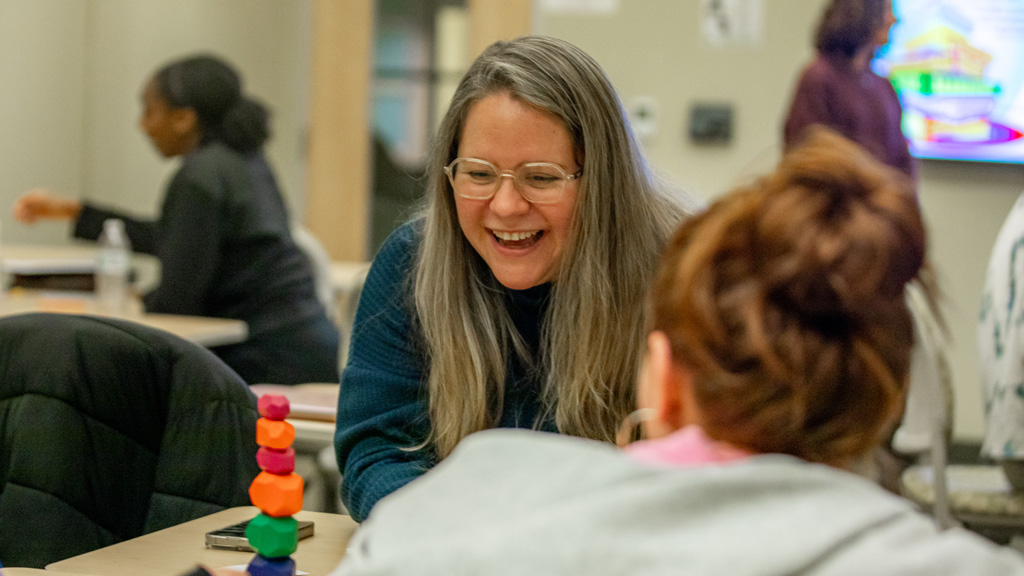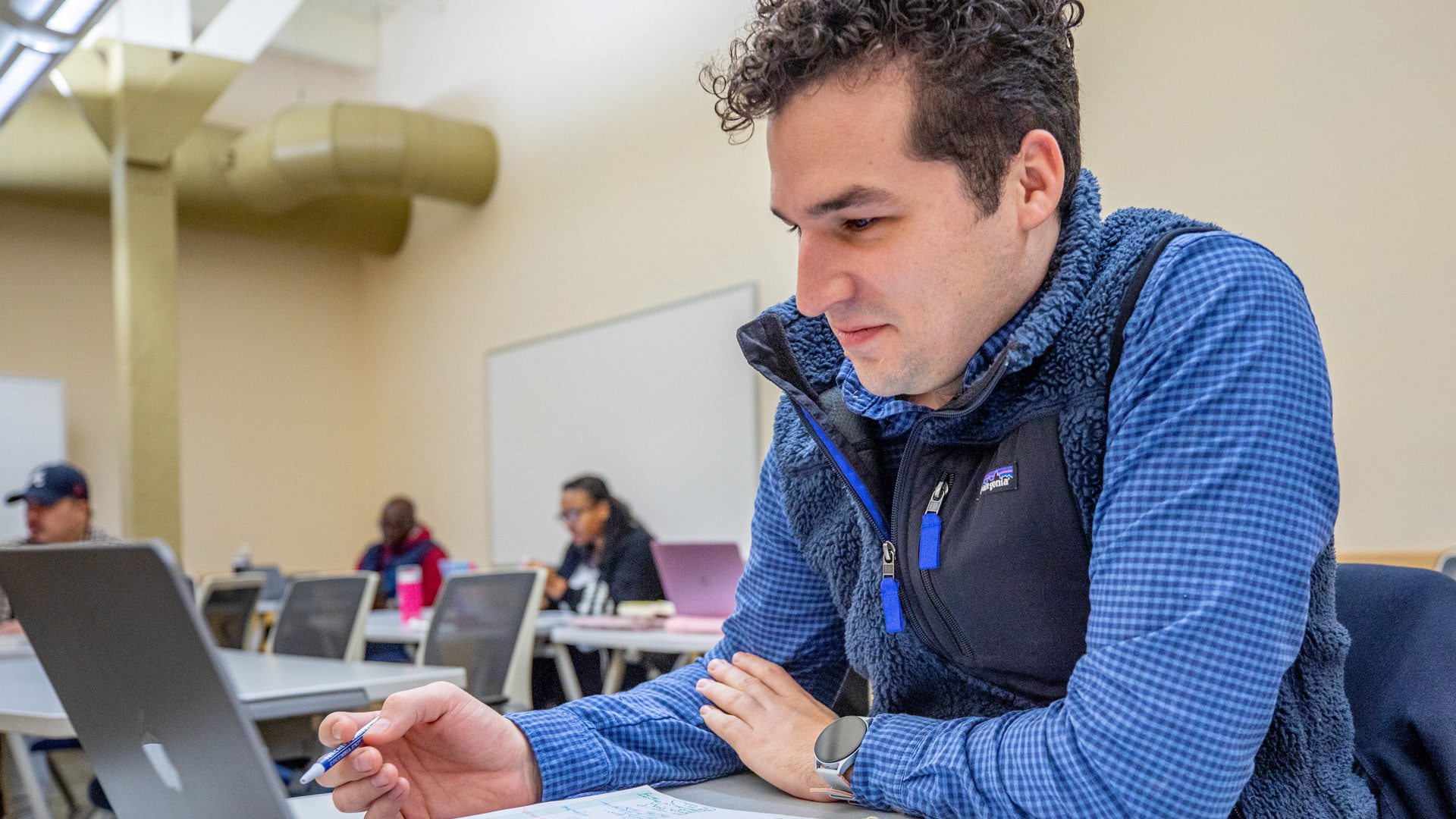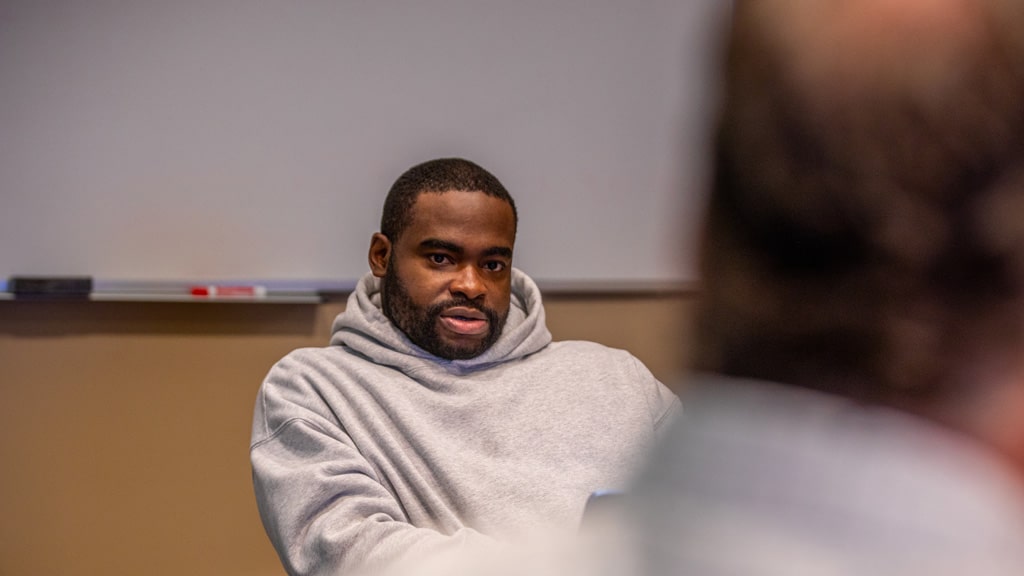Doctoral Degrees That Make a Difference
Earning a doctoral degree is a milestone in your education that can open doors to new careers and professional opportunities. Depending on your field — business, health and wellness, education and beyond — a doctorate can empower you to teach, lead and influence others in your discipline.
Which Doctorate is best for you? There are two types: research-oriented and applied, or professional programs. Research-oriented programs, such as a Doctor of Philosophy (PhD), Doctor of Education (Ed.D.), and Doctor of Business Administration (DBA) among others, focus on specialized disciplines and generally prepare you for a career as a professor or researcher in academia.
Through applied or professional doctoral programs, you'll learn advanced skills for specific careers such as medical doctor, psychologist or physical therapist.
JWU offers both research-oriented and applied doctorates and a benefit of all our doctoral programs is that they are delivered as a cohort; you’re with the same group of students throughout the program, you'll get to know and support one another, brainstorm and problem solve with them and add them to your professional network.

College of Health & Wellness
Our College of Health & Wellness offers two doctoral degrees — an Occupational Therapy Doctorate (OTD) and a Doctor of Physical Therapy (DPT).
Dean of the College of Health & Wellness, Maura Daly Iversen, PT, DPT, SD, MPH, FAPTA, FNAP, shares some basics of the two healthcare fields and their related degrees:
“Occupational therapy (OT) and physical therapy (PT) are similar because they both focus on helping you support an independent lifestyle, work on your ability to conduct activities for daily life and engage in the workplace.”
“Physical therapy is focused more on neuromuscular motor control type activities and there are more science prerequisites for a DPT program. For occupational therapy, you are more heavily laden toward psychology courses. Both programs are also good options for career changers who meet the required prerequisites.”
If you’re considering a PT or OT career but aren’t sure which program is best for you, here's more details on both.

Occupational Therapy Doctorate
JWU’s holistic OTD program addresses patients’ physical, psychological and emotional needs. You’ll learn how to help patients maximize their health, well-being and quality of life while increasing their independence, self-confidence and self-worth.
The 36-month program is an entry-level program, meaning it is a pathway for students with a bachelor’s degree to apply to a doctorate program without having to earn a separate master’s degree first.
The program's facilities include innovative labs such as an Occupations Lab with a living room, kitchen and bathroom to practice skills in a home-like environment; a simulated hospital setting with equipment found in hospitals; a simulator manikin; and a sensory pediatrics lab for working with children.
The OT program is collaborative with programs within other JWU colleges including the College of Arts & Sciences and the College of Food Innovation & Technology.To gain the practical experience you’ll need as an OT practitioner, you’ll apply what you learn in the classroom through fieldwork out in the community working with patients from pediatrics to older adults. You’ll also engage in group projects, individual capstone projects and research, leadership and service opportunities.
Doctoral Experience: Molly Gould ’24 OTD
Recent OTD graduate Molly Gould shared their impressions about the Level II fieldwork experience at Butler Hospital they completed and about the OTD faculty: “I was lucky to land the director of OT as my site supervisor, as we both held a mutual passion for working with the intellectual/developmental disability (IDD) population. This meant I was working on one of the two intensive care units where people with higher-level needs were placed.”
“Not only do we have incredibly talented, intelligent, creative faculty but we have teachers that advocate for us and care about us.”
Planning Ahead for Your Career
“For students planning on an OT career, there are options for both master’s and doctoral degrees offered. The trend for earning a doctorate is rising, it's almost 50-50 for master's and doctorates, so students graduating from doctoral programs like JWU’s will be well-prepared for the future,” Iversen shared.
If you’re eager to earn your OTD and start your career as soon as possible, JWU’s combined Health Science B.S./Occupational Therapy OTD program allows you to earn both degrees in as little as six years.

Doctor of Physical Therapy
Physical therapists (PT) work with doctors, surgeons and other healthcare providers to develop and implement treatment plans to help patients recovering from health problems such as strokes or injuries to recover their mobility. A fair number of practitioners focus on working with athletes on performance or rehabilitation after sports injuries.
During JWU’s 30-month (eight semesters) DPT program, you’ll gain the skills and hands-on experience you'll need as a PT practitioner. You'll apply and practice what you learn in the classroom through Integrated Clinical Education, community service-learning opportunities, clinical training and a research capstone. The program also prepares our DPT graduates to take the National Physical Therapy Examination (NPTE.)
As a DPT student, you’ll have opportunities to learn collaboratively with students from other programs such as Occupational Therapy, Physician Assistant Studies, Dietetics and Applied Nutrition, Exercise and Sports Science, Health Science and Public Health.
The program's state-of-the-art labs include two dedicated PT labs, a cadaver lab, a pediatric lab, and a hospital simulation lab with ICU, emergency, labor and delivery rooms. Other highlights of the program are small class sizes and faculty mentoring for all students.
College of Arts & Sciences
Doctor of Educational Leadership (Ed.D.)
If your career is in a teaching and learning environment and you’re looking to expand your education and move up to a higher-level position, earning a Doctor of Educational Leadership (Ed.D.) could be the best path for you.
Whether you currently work in higher education or in elementary or secondary levels, or plan to in the future, JWU's Doctor of Educational Leadership (Ed.D.) has separate tracks for both areas. Victor Mercurio, Ed.D., director of the Doctor of Education Programs at JWU, sums up the program:
“In our Ed.D. program it's all about building the skill sets of leaders, enabling you to look at problems at a systems level and through a variety of different lenses that students can use to help solve problems of practice in their own environments. The program is designed for practitioners in two tracks, one for the elementary and secondary levels and the second for those in higher education fields who are looking to pursue a degree in leadership and are on a leadership journey. Each track has a separate cohort of students who learn together throughout the program through synchronous and asynchronous courses held both remotely and in person."
The program's first two years are focused on coursework followed by a comprehensive assessment. The third year concentrates on the dissertation phase. During courses and your dissertation work, faculty mentoring and advising are important parts of the program.
“The program is highly individualized, and from the moment students join us until they sit for their dissertation defense, we are constantly available to them, interacting with them and supporting them so they can be successful. In the program’s third year you’re assigned an advisor and have a committee help you work through the proposal and dissertation phase and defense,” noted Mercurio.
“Another hallmark of the program is that it’s a safe space for students to come together, share their problems of practice and challenge each other about how they are thinking and how they would solve a problem.”
Doctoral Experience: Luckson Omoaregba ’26 Ed.D.
Director of Pathway Programs, Warren Alpert Medical School, Brown University
Student Luckson Omoaregba offered details about his experience with the program: “The biggest thing for me was the people I knew, looked up to and considered mentors who had already gone through the program. I had already interacted with several alumni, and that was a huge selling point for me.”
“Every faculty member here has had guest speakers who are doing the work every day, whose jobs are focused on increasing student retention. We've had general counsels from regional higher education institutions, presidents of colleges and others who came into the classroom to talk about the work that they do and how it applies. It’s a tremendous networking opportunity.”

College of Hospitality & Business
Doctor of Business Administration (DBA)
If you’re considering a DBA program, its likely you’re planning to move up in your career and you already have a busy job and a tight work-life balance.
The flexible, fully-online DBA program at JWU, with a challenging, career-focused curriculum, could be an ideal fit if you already have management and leadership experience.
The program is delivered as a cohort, allowing you to learn with the same group of students throughout the duration of the program, getting to know each other, learning from one another and becoming part of a larger network of DBA students and alumni.
Doctoral Experience: Suzannah Hicks ’24 DBA
AI Program Architect, Hummingbird Healthcare
Recent graduate Suzannah Hicks shared her thoughts on the program: “I compared doctoral (PhD) degrees in data science with Doctor of Business Administration programs. Both are scholarly degrees; however, research in a PhD program emphasizes theoretical knowledge, while a DBA is geared toward applied research that I knew would support my goal to lead organizations in implementing innovative data and AI solutions. I felt JWU’s DBA program, which has a concentration in Organizational Development, would be a powerful addition to my existing education and experience.”
The online Doctor of Business Administration (DBA) program at Johnson & Wales has been recognized by Forbes Advisor as one of the 10 Best Online DBA Programs of 2024.



